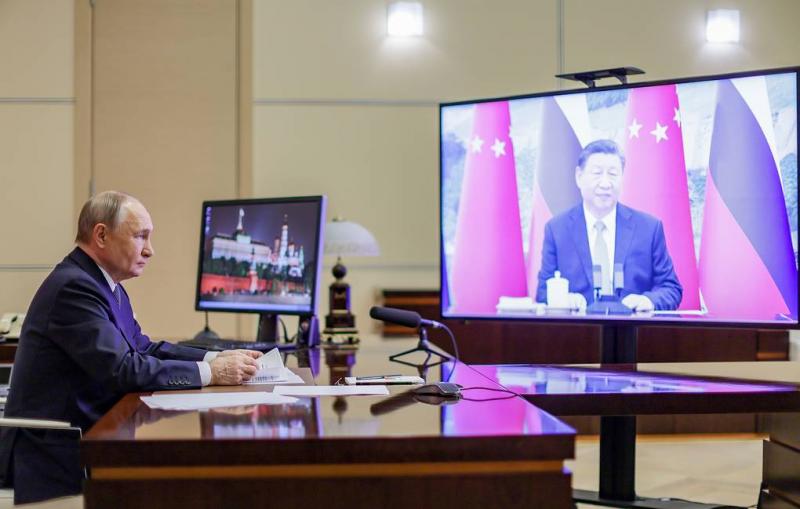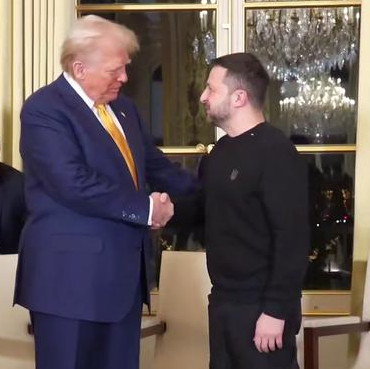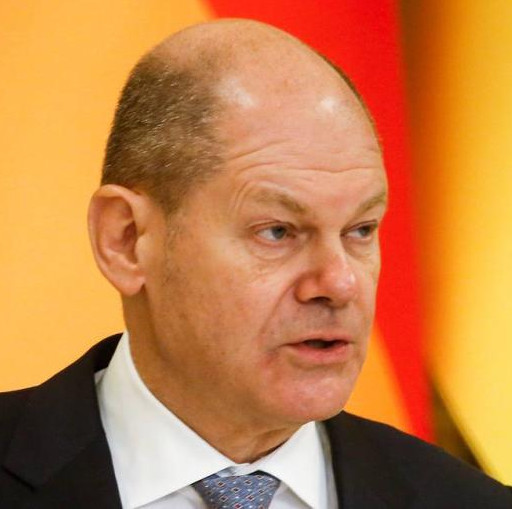
- Press review: US suspends USAID aid to Central Asia while Hamas visits Moscow again
- Press review: US urges elections in Ukraine as Trump enforces tough import tariffs
- Press review: NATO increases defense spending as Russia-Germany trade turnover falls
- Press review: Kiev may lose military aid while Trump
Russia’s Vladimir Putin and China’s Xi Jinping conduct a video call after Donald Trump’s inauguration; the newly sworn-in US president takes steps to suspend US foreign assistance. Meanwhile, foreign military aid to Ukraine appears to persist uninterrupted even after this directive from Trump. These stories topped Wednesday's newspaper headlines in Russia.
Izvestia: Putin, Xi hold video conference following Trump’s inauguration
On Tuesday midday, Russian President Vladimir Putin and Chinese leader Xi Jinping held their first conversation of the year via video link. While the online meeting lasted more than 90 minutes, its open portion was less than 10 minutes long. The two leaders focused on bilateral relations and their future development.
The relationship between Russia and China is self-sufficient and not subject to global trends, Putin stated, while Xi remarked that, in 2025, his country is preparing to elevate its relations with Russia to a higher level. The two heads of state also held a thorough discussion on international matters, including the Ukraine situation, the Kremlin reported. Putin informed Xi that Moscow is ready to engage with the new US administration on this issue.
Experts suggest that after Donald Trump’s swearing-in, global politics is becoming even more unpredictable. Now, with a new US president bursting with new ideas and reassessing decisions made by his predecessors, China will continue to exemplify stability in its foreign policy direction, reliability, and predictability, according to Alexander Lomanov, deputy director of the Russian Academy of Sciences’ Institute of World Economy and International Relations, who spoke with Izvestia.
"Trump <…> is clearly looking to engage with both countries and assess if he can secure advantages for America without resorting to threats of force or imposing additional sanctions. However, the trust level between Moscow and Beijing far exceeds that between Moscow and Washington. This gives Moscow and Beijing significantly more opportunities to build mutual trust and achieve a shared position on complex issues," he emphasized.
In this context, Russia and China will likely strengthen their coordination on key bilateral cooperation issues and the global agenda, said Yekaterina Zaklyazminskaya, senior researcher at the Center for World Policy and Strategic Analysis at the Russian Academy of Sciences’ Institute of China and Modern Asia. "Trump’s arrival will shake up all nations. The highly energetic start to the 47th US president’s second term, as seen in the numerous executive orders signed on his first day in office, marks just the beginning of Trump administration 2.0," the expert believes.
Izvestia: US set to reconsider its aid to allies
Since Donald Trump returned to the White House, he has already enacted numerous high-profile orders, including one pausing US foreign assistance for 90 days. Trump also announced the country’s withdrawal from the World Health Organization and the Paris Climate Agreement while urging NATO allies in Europe to increase their defense expenditures to 5% of GDP.
According to Mikhail Mironyuk, an associate professor in the Department of Politics and Management at the Higher School of Economics, the US aims to maintain flexibility in global organizations used as instruments of international influence. "The concept is this: fewer obligations and constraints imposed by multilateral bodies, dominated, say, by China, would allow more leeway for using leverage and exerting pressure to shape their policies," he explained to Izvestia.
The decision to pause US foreign assistance and exit major international organizations and agreements may strain relations with allied nations. As a NATO partner, Brussels, for instance, has already expressed unease with the initial actions of the new administration, Mironyuk noted.
Thus, Trump is not working to make Europe more autonomous in terms of security but instead to deepen its reliance on the United States, particularly in terms of "compliance" and controllability, he argued. The European Commission has already reacted and appears to be adjusting its stance. However, it’s important to recognize that only a handful of European allies are capable of allocating 5% of GDP for defense spending.
"Trump has a marked aversion to globalists, liberals, and environmentalists, which includes a significant number of EU leaders with similar leanings. He is signaling that America might not always be willing to defend European interests. This stance could also tie into potential upcoming negotiations between Moscow and Washington regarding Ukraine," American historian and former Harvard University professor Vladimir Brovkin told the newspaper.
Nezavisimaya Gazeta: Western military experts keep assisting Ukraine, despite Trump’s statements
US President Donald Trump’s directive halting military aid to Ukraine appears not to have disrupted the former Soviet republic’s collaboration with the militaries of the United States or its NATO allies. Judging from media reports, at least 60 officers from the CIA and the Pentagon are maintaining their regular roles in Kiev as military advisers from the Office of Defense Cooperation at the US embassy in Kiev. They are primarily responsible for helping Ukrainian forces acquire expertise in unconventional warfare and intelligence techniques, according to a recent report from The New York Times. Monitoring channels indicate that NATO and US reconnaissance aircraft have been actively patrolling regions over the Black Sea, ramping up surveillance of Russian strongholds.
The United States may stand to gain from disrupting Russia’s gas infrastructure in the Black Sea. Upon taking office, Trump declared the US exit from several climate and environmental restrictions on resource production, stating that his country would accelerate oil and gas production. "Russia, which exports affordable natural gas to Turkey and Europe, serves as a competitor to the US. As long as the Ukraine-Russia conflict persists, Trump might aim to reshape this scenario through Kiev’s involvement," military expert and retired Colonel Nikolay Shulgin told Nezavisimaya Gazeta. He emphasized the presence of active-duty personnel from NATO countries in Kiev, who serve as military advisers assisting the Ukrainian military command in addressing combat challenges at the frontline.
"Reliable sources indicate that French troops, recently deployed near [Russia’s] Kursk Region, are coordinating with Ukraine’s Special Operations Center South stationed near [Ukraine’s] Sudzha," Shulgin elaborated.
"In a context where peaceful resolutions seem possible, the United States and its Western allies are working to achieve combat objectives using their militaries and mercenaries, as Ukraine’s military forces face a numerical disadvantage," retired colonel and military analyst Vladimir Popov explained to Nezavisimaya Gazeta. "This might ostensibly enable Kiev and NATO allies to negotiate with Russia from a stronger bargaining position. However, Russian troops consider every NATO soldier or mercenary a valid target," he concluded.
Izvestia: South Africa encourages Kiev to engage in dialogue with Moscow
Ukraine should not reject dialogue with Russia, the South African embassy told Izvestia. The United Nations should also facilitate the necessary conditions for such discussions, Pretoria suggests. African leaders, including South Africa, are actively exploring potential resolutions to the conflict by engaging with both the Russian and Ukrainian governments, the embassy added.
It’s important to note that Africa does not perceive the Ukraine conflict as a battle for democratic principles, as described by Western narratives, but rather as a confrontation between Russia and the West, according to French journalist Francois Soudan, editor at Jeune Afrique magazine. The continent’s leaders do not view Russia as a threat and instead focus on addressing their own pressing humanitarian crises, he emphasized.
"The main interest lies in ensuring the continued normal supply of grain to Africa. And, of course, the normalization of logistics both to and from the continent," Alexey Maslov, director of Moscow State University’s Institute of Asian and African Studies, told Izvestia.
African nations have recently enhanced their political standing and could theoretically take on the role of mediators in negotiations concerning Ukraine. According to Maslov, South Africa, which currently holds the rotating G20 presidency and became a BRICS member in 2011, is seen as a significant player due to its active participation as a BRICS nation and its relatively greater influence. "However, other leaders, such as those from Tanzania and Kenya, as well as Mali and Burkina Faso, have expressed similar views, though their perspectives have not gained much attention," the expert elaborated to Izvestia.
Meanwhile, peace proposals from more experienced mediators, such as China and Brazil, have failed to gain traction with Ukraine or its Western allies. The joint Chinese-Brazilian initiative for resolving the Ukraine conflict, the Friendship for Peace platform, has primarily garnered interest from countries in the Global South, particularly in Africa. However, Western nations have shown little enthusiasm for this approach, Chinese Ambassador to Russia Zhang Hanhui revealed to Izvestia.
Rossiyskaya Gazeta: How Russian, global markets reacted to Trump’s first statements
The inauguration of Donald Trump, his initial remarks, and his earliest executive orders as US president have not significantly disrupted global financial markets, including the Russian one, with meme coins launched by Trump and his wife being the only assets that plummeted.
On Tuesday, Russian stocks opened lower, while the magnitude of the market adjustment did not exceed 1% during the day. The market decline might have been caused by last week’s overconfidence among market participants, Vyacheslav Berdnikov, head of public stock analysis at Sovcombank, theorized, suggesting the adjustment could be purely technical.
"In his inaugural address, the [US] president did not explicitly reference Russia, nor were there any immediate positive actions regarding [US] relations with Russia among the president’s initial directives, while the politician emphasized the need to expand US oil and gas production, which impacted oil prices," the analyst noted.
However, Trump’s statements, particularly his decision to ease restrictions on LNG exports, directly affected the oil and gas market, as European gas prices continued to experience volatility, Kirill Klementyev, an analyst at Tsifra Broker, told Rossiyskaya Gazeta.
Asian markets, including the Chinese one, also reacted steadily to Trump’s remarks, while sentiment in the European market was neutral. Although US exchanges were closed for a national holiday on Monday, US index futures showed modest gains on Tuesday afternoon.
TASS is not responsible for the material quoted in these press reviews









